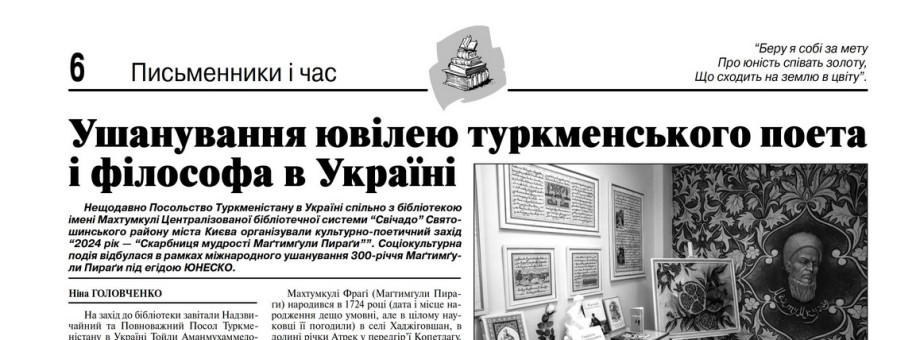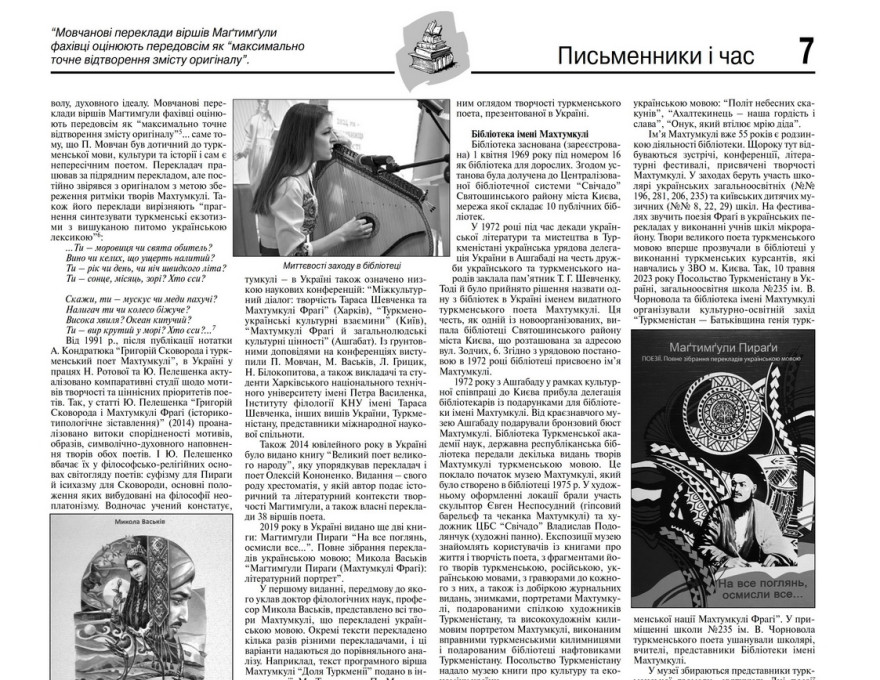ABOUT THE OUTSTANDING TURKMEN POET AND PHILOSOPHER MAGTYMGULY FRAGI AND THE CELEBRATION OF THE 300TH ANNIVERSARY IN THE PUBLICATION OF THE ALL-UKRAINIAN CULTURAL WEEKLY “SLOVO PROSVITY”
An article in the next issue of the All-Ukrainian cultural weekly “Slovo Prosvity”, published on April 11, 2024, is dedicated to honoring the anniversary of the Turkmen poet and philosopher Magtymguly Fragi in Ukraine, the chief editor of which is the Honored Artist of Ukraine, a famous poet, writer, translator of Fragi’s poems into Ukrainian, laureate of the state award of Turkmenistan - “Magtymguly Fragi Medal” Pavel Movchan. The article notes that experts evaluate Magtymguly’s poems translated by Pavel Movchan as the most accurate reproduction of the content of the original.
The author of the article - teacher, literary critic, candidate of pedagogical sciences, associate professor, member of the National Union of Journalists of Ukraine Nina Golovchenko raised in the article a number of topics dedicated to the life of the poet Magtymguly, the study and translation of his creative heritage in Ukraine, the history and current activities of the library named Magtymguly in the Ukrainian capital, as well as how the days of celebration of the 300th anniversary of Magtymguly Fragi, celebrated by the world community under the auspices of UNESCO, take place in Kyiv.
The author talks about the origins of Fragi, about the famous father poet-shahir Dovletmammet Azadi, about how hard he studied and was engaged in various types of crafts. But his main occupation was poetry. The poet's creative heritage includes more than 800 works and several poems. The author writes about more than 100 notebooks of lists of works preserved to this day, which are used by literary scholars and historians. Tells about foreign researchers of Fragi's work, citing their statements about the value of Magtymguly's poems - the pearls of Turkmen, Turkic-language and world poetry.
Magtymguly, who managed to bring the Turkmen poetic language closer to colloquial speech, actually became the founder of the modern literary norm of the Turkmen language, which, as the author notes, referring to the statements of scientists, was formed half a century earlier than, for example, the Ukrainian language, the founder of which was I. Kotlyarevsky.
The author of the article thoroughly approached the coverage of the history of translations of the study of Magtymguly’s poetry in Ukraine, which began with Agathangel Krymsky, who spoke the Turkmen language. The article talks about the works of Y. Shporta, Agata Turchynska, Pavel Tychyna, Leonid Pervomaysky, which formed a generalized image of the poet, indicating the similarity of the creative world of Magtymguly Fragi, Taras Shevchenko, Grigory Skovoroda.
Mention is made of the first collection of translations into Ukrainian of 46 works by Fragi with the participation of poet-translators V. Mysik, M. Tereshchenko,
V. Bychko, N. Zabila, V. Sosyura and others, published in 1962, in the preface to which L. Ponomarenko systematically described the biography of the classic of Turkmen literature, his era and creative heritage for the first time in Ukraine.
Much credit for popularizing Fraga’s work in Ukraine belongs to the famous poet and writer, our contemporary Pavel Movchan. In 1983 117 songs of Magtymguly in his translations were released, and in 2013-2014 were released the collections “Magtymguly. Poetry." In the preface P. Movchan thoroughly characterizes the creative heritage of Magtymguly, speaks of the simplicity and lightness of the artistic form, the predominantly traditional educational content of the songs, and the creativity that expanded the thematic and philosophical horizons of the “red writing of Turkmenistan.” Movchan considers the dominant theme of Fraga’s work to be the theme of love as a symbol, a spiritual ideal.
A. Kondratyuk and Y. Peleshenko at one time analyzed the origins of the kinship of motifs, images, symbolic and spiritual content in the works of the philosophers Magtymguly and Grigory Skovoroda.
The author talks about the reference book by the author Alexey Kononenko “The Great Poet of a Great People” of 2014, a kind of anthology that provides the historical and literary contexts of Fraga’s work, as well as his own translations of 38 poems by the Turkmen poet.
Translations of Magtymguly poetry into Ukrainian were collected and published in 2019 by Professor Mykola Vaskiv under the title “Magtymguly Pyragy. Look at everything, understand everything…”, where Fraga’s poems in translations by different authors are presented for comparative analysis. In the same year he systematized information about the poet’s life and work, studied his creative heritage, and analyzed the translations in the monograph “Magtymguly Pyragy (Makhtumkuli Fragi): a literary portrait.”
The author of the article talks about how widely the 290th anniversary of the poet’s birth was celebrated in different cities of Ukraine. Describes the places where two cultures connect and outstanding personalities of Turkmen and Ukrainian history are honored. Among them are the monument to Magtymguly Fragi in Kyiv, and the monument to Taras Shevchenko in Ashgabat, and the Kyiv library named Magtymguly from 1972. The library has the Magtymguly Museum. This year, with the assistance of the Ministry of Culture of Turkmenistan, the museum was replenished with very valuable exhibits of decorative and applied arts of Turkmenistan and Turkmen book products. Since the beginning of the current anniversary year, the Embassy of Turkmenistan and the Library named Magtymguly jointly held a cultural and poetic event under the name, consonant with the name of the year in Turkmenistan, “The Fount of Wisdom Magtymguly Fragi” and a number of other cultural meetings dedicated to honoring the 300th anniversary of the outstanding Turkmen poet and philosopher Magtymguly Fragi.


 NEWS
NEWS



